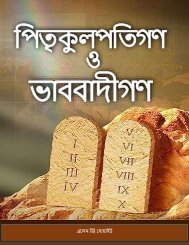Finishing the Race
Of all the games instituted among the Greeks and the Romans, the races were the most ancient and the most highly esteemed … The contests were governed by strict regulations, from which there was no appeal. Those who desired their names entered as competitors for the prize had first to undergo a severe preparatory training. Harmful indulgence of appetite, or any other gratification that would lower mental or physical vigour, was strictly forbidden. For one to have any hope of success in these trials of strength and speed, the muscles must be strong and supple, and the nerves well under control. Every movement must be certain, every step swift and unswerving; the physical powers must reach the highest mark.
Of all the games instituted among the Greeks and the Romans, the races were the most ancient and the most highly esteemed … The contests were governed by strict regulations, from which there was no appeal. Those who desired their names entered as competitors for the prize had first to undergo a severe preparatory training. Harmful indulgence of appetite, or any other gratification that would lower mental or physical vigour, was strictly forbidden. For one to have any hope of success in these trials of strength and speed, the muscles must be strong and supple, and the nerves well under control. Every movement must be certain, every step swift and unswerving; the physical powers must reach the highest mark.
You also want an ePaper? Increase the reach of your titles
YUMPU automatically turns print PDFs into web optimized ePapers that Google loves.
What say <strong>the</strong> Scriptures concerning <strong>the</strong>se things? David declares that man is not<br />
conscious in death. "His breath goeth forth, he returneth to his earth; in that very day his<br />
thoughts perish." Psalm 146:4. Solomon bears <strong>the</strong> same testimony: "The living know that<br />
<strong>the</strong>y shall die: but <strong>the</strong> dead know not anything." "Their love, and <strong>the</strong>ir hatred, and <strong>the</strong>ir<br />
envy, is now perished; nei<strong>the</strong>r have <strong>the</strong>y any more a portion forever in anything that is done<br />
under <strong>the</strong> sun." "There is no work, nor device, nor knowledge, nor wisdom, in <strong>the</strong> grave,<br />
whi<strong>the</strong>r thou goest." Ecclesiastes 9:5, 6, 10.<br />
When, in answer to his prayer, Hezekiah's life was prolonged fifteen years, <strong>the</strong> grateful<br />
king rendered to God a tribute of praise for His great mercy. In this song he tells <strong>the</strong> reason<br />
why he thus rejoices: "The grave cannot praise Thee, death cannot celebrate Thee: <strong>the</strong>y that<br />
go down into <strong>the</strong> pit cannot hope for Thy truth. The living, <strong>the</strong> living, he shall praise Thee,<br />
as I do this day." Isaiah 38:18, 19. Popular <strong>the</strong>ology represents <strong>the</strong> righteous dead as in<br />
heaven, entered into bliss and praising God with an immortal tongue; but Hezekiah could<br />
see no such glorious prospect in death. With his words agrees <strong>the</strong> testimony of <strong>the</strong> psalmist:<br />
"In death <strong>the</strong>re is no remembrance of Thee: in <strong>the</strong> grave who shall give Thee thanks?" "The<br />
dead praise not <strong>the</strong> Lord, nei<strong>the</strong>r any that go down into silence." Psalms 6:5; 115:17.<br />
Peter on <strong>the</strong> Day of Pentecost declared that <strong>the</strong> patriarch David "is both dead and buried,<br />
and his sepulchre is with us unto this day." "For David is not ascended into <strong>the</strong> heavens."<br />
Acts 2:29, 34. The fact that David remains in <strong>the</strong> grave until <strong>the</strong> resurrection proves that <strong>the</strong><br />
righteous do not go to heaven at death. It is only through <strong>the</strong> resurrection, and by virtue of<br />
<strong>the</strong> fact that Christ has risen, that David can at last sit at <strong>the</strong> right hand of God. And said<br />
Paul: "If <strong>the</strong> dead rise not, <strong>the</strong>n is not Christ raised: and if Christ be not raised, your faith is<br />
vain; ye are yet in your sins. Then <strong>the</strong>y also which are fallen asleep in Christ are perished." I<br />
Corinthians 15:16-18. If for four thousand years <strong>the</strong> righteous had gone directly to heaven at<br />
death, how could Paul have said that if <strong>the</strong>re is no resurrection, "<strong>the</strong>y also which are fallen<br />
asleep in Christ are perished"? No resurrection would be necessary.<br />
The martyr Tyndale, referring to <strong>the</strong> state of <strong>the</strong> dead, declared: "I confess openly, that I<br />
am not persuaded that <strong>the</strong>y be already in <strong>the</strong> full glory that Christ is in, or <strong>the</strong> elect angels of<br />
God are in. Nei<strong>the</strong>r is it any article of my faith; for if it were so, I see not but <strong>the</strong>n <strong>the</strong><br />
preaching of <strong>the</strong> resurrection of <strong>the</strong> flesh were a thing in vain."--William Tyndale, Preface<br />
to New Testament (ed. 1534). Reprinted in British Reformers--Tindal, Frith, Barnes, page<br />
349. It is an undeniable fact that <strong>the</strong> hope of immortal blessedness at death has led to a<br />
widespread neglect of <strong>the</strong> Bible doctrine of <strong>the</strong> resurrection. This tendency was remarked by<br />
Dr. Adam Clarke, who said: "The doctrine of <strong>the</strong> resurrection appears to have been thought<br />
of much more consequence among <strong>the</strong> primitive Christians than it is now! How is this? The<br />
apostles were continually insisting on it, and exciting <strong>the</strong> followers of God to diligence,<br />
obedience, and cheerfulness through it. And <strong>the</strong>ir successors in <strong>the</strong> present day seldom<br />
mention it! So apostles preached, and so primitive Christians believed; so we preach, and so<br />
our hearers believe. There is not a doctrine in <strong>the</strong> gospel on which more stress is laid; and<br />
342


















